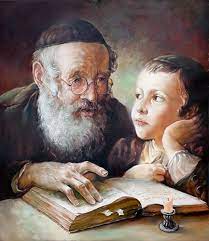Ha’azinu – And Zaidy Makes Three

The Gemara (Shabbos 88a) quotes “a certain Galilean” as having said “Blessed is the Merciful One, Who gave a three-fold Torah [in the broad sense, Torah, Neviim and Ksuvim] to a three-fold nation [Cohanim, Levi’im and Yisraelim] by means of a third-born [Moshe] on the third day [of separation of men and women] in the third month [Sivan].” (“Galilean,” interestingly, in Hebrew, contains the gematria letter for “3” and – twice – “33”)
The stress on threes concerning the giving of the Torah, it occurs to me, may reflect the essence of mesorah itself, that is to say, its transmittal. Just as the most elemental physical chain needs three links, so, too, the conceptual one. Each of us is a middle link; we must have received the mesorah and then transmitted it. And our recipients then become middle links themselves.
In parshas Haazinu, we read, similarly: “Ask your father and he will tell you, your grandfather and he will say to you” (Devarim 32:7). The threesome chain again.
And, intriguingly, the word employed for the father’s telling is “viyagedcha”, from the root lihagid — which Rashi elsewhere (Shemos 19:3) says implies an element of harshness; and for the grandfather’s telling, the word is viyomru – whose root, omer, Rashi (ibid) characterizes as a “soft” communication.
The Torah may mean to teach here that a father must be an authority figure, and his transmittal of the mesorah more demanding, while a grandfather’s guidance is to be, well, grandfatherly, imparted with a more gentle touch.
© 2023 Rabbi Avi Shafran
My most recent Ami Magazine column, “All the Naarishkeit Unfit to Print,” can be read here.
A piece I wrote about asylum seekers was published by Religion News Service, and can be read here.
And a Yom Kippur-themed “oldie” is here.




Recent Comments